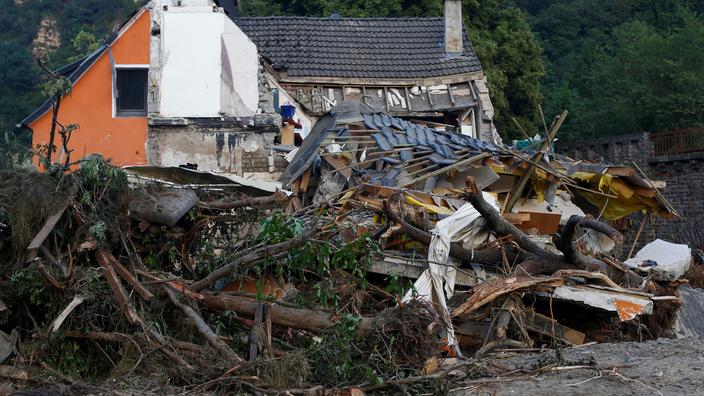“
80 stations and stopping points damaged, switches, signaling technologies, signaling posts, bridges destroyed, more than 600 kilometers of tracks affected.
This is the first assessment of the Deutsch Bahn (DB), on the damage caused to rail infrastructure, by the record floods that hit western Germany.
Although partial, this inventory gives an idea of the extent of the material destruction caused by the torrential rains that hit the country on July 14 and 15.
It is added to the very heavy human toll, with 170 deaths enumerated on Wednesday, July 21, a figure which is likely to increase further.
Read also: Floods: the Vesdre and its tributaries sowed desolation throughout the valley
If the time is still for mourning and emotion across the Rhine, the question of funding is beginning to emerge. Passing Sunday, July 18 in the flooded area of Rhineland-Palatinate, Chancellor Angela Merkel was not mistaken in recalling that “
luckily, Germany is a country which can cope financially.
"His Minister of Finance spoke to him about
" a reconstruction program in billions of euros, so that we can move forward quickly ".
Initially, the Länder (regions) and the federal government took charge of the deployment of emergency measures.
On Wednesday July 21, Berlin and the Länder thus pledged to pay an equal amount of 400 million in immediate aid.
It is a question of dealing with the most urgent, such as securing damaged buildings and infrastructure in the regions most affected by floods, some deprived of drinking water and electricity.
More than half of uninsured buildings
But there is already the question of reconstruction and the amount of compensation to be paid. If the insurer Allianz Deutschland specifies in
Le Figaro
that
"
at
present, [he cannot] give any information on the amount of the damage
" and that "
claims adjusters are on site to make assessments
", the note risks be salty. In a statement Jörg Asmussen, managing director of the German Insurance Association (GDV), estimated that “at
present we are on insured losses of 4 to 5 billion euros.
".
A figure that could explode again: in comparison, the floods which hit several central European countries in August 2002 (including Germany, the Czech Republic, Slovakia, Austria and Hungary), making more than one hundred deaths, had caused more than 20 billion euros in damage in total, according to a report from the French Ministry of Ecology published in 2003.
Read also: Floods: Wallonia is living a hell underwater
The issue of payment could be particularly complex in Germany.
If in France, the subscription to a guarantee known as "
catnat
" (natural disaster), which covers floods, is made compulsory by law, this is not the case across the Rhine.
According to the German Insurance Association (GDV), only 46% of buildings are insured against these risks with large disparities depending on the region.
Baden-Württemberg, where this protection was compulsory until 1993, has for example a coverage rate of 94% while Rhineland-Palatinate, one of the regions most affected by flooding, only reaches 37%.
Electoral context
To fill these holes in the disaster victims' rack, the minister-presidents of the various regions of Germany agreed in 2017 to pay state aid to those who have not succeeded in obtaining insurance or who have fallen into disrepair. seen to offer an insurance offer on economically unacceptable conditions. For Paul Maurice, researcher at the study committee on Franco-German relations at IFRI, all the victims will be compensated as follows: “
There is a real trauma in the country and a surge of solidarity for the victims. The Minister of Finance will release very significant funds, to avoid creating resentment among this population.
"
Another element could play in favor of the victims: the approach of the federal elections which are to be held on September 26: “
on one side we have Armin Laschet, the candidate of the Christian-Democrat Union (CDU, right), and Minister President of North Rhine-Westphalia, one of the affected regions.
On the other hand, Olaf Scholz, candidate for the Social Democratic Party (SPD, left), and Federal Minister of Finance, the one who holds the purse strings
, ”explains Paul Maurice.
Read also: Bad weather in Europe: the call for help from Belgium has been heard
The multiplication and worsening of natural disasters risk, however, forcing the Länders to rethink their systems of financing and pooling of risks. "
Can insurance companies continue to cover this type of event?
“, Asks Paul Maurice.















